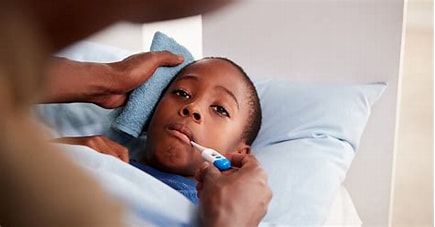
Fever in children is a common concern for parents and caregivers. A fever helps the body by stimulating the immune system to fight an infection. Here’s a comprehensive overview of what you need to know:
What is a Fever?
- Definition: A fever is generally defined as a body temperature above the normal range. In children, a fever is typically considered to be a temperature of 100.4°F (38°C) or higher.
- Measurement Methods:
- Oral: Through the mouth.
- Rectal: Through the rectum (considered the most accurate for infants).
- Axillary: Under the arm.
- Tympanic: In the ear.
- Temporal: Across the forehead.
Causes of Fever in children
- Infections: Bacterial, viral, or fungal infections.
- Immunizations: Fever can occur as a side effect of some vaccinations.
- Overheating: Excessive clothing or hot weather.
- Teething: Mild fever can be associated with teething, but typically not above 100°F (37.8°C).
- Over dressing: infants especially new born, may get fevers especially if they are overdressed, wrapped in blanket or in a hot environment because they don’t regulate their body temperature unlike older kids. However, if the fever is persistent, medical attention is necessary.
When to Worry
- Infants under 3 months: Any fever in this age group requires immediate medical attention.
- Persistent fever: Fever lasting more than 3 days.
- High fever: Above 104°F (40°C).
- Symptoms of serious illness: Such as difficulty breathing, persistent vomiting, lethargy, rash, or seizures.
What are the signs of a fever in children?
- Feel warm
- Act differently (unusually quiet, irritable)
- Have a headache
- Have chills or sweating
- Breathe a little faster or have a faster heart rate than normal
- Crying a lot
Managing Fever at Home
- Hydration: Ensure the child drinks plenty of fluids to prevent dehydration.
- Comfort: Dress the child in lightweight clothing and keep the room cool.
- Medication: Use Paracetamol or ibuprofen as directed by a healthcare provider. Avoid aspirin in children due to the risk of Reye’s syndrome.
- Rest: Encourage the child to rest and sleep as needed.
When to See a Doctor
- Infants under 3 months with any fever.
- Children 3 months to 3 years with a fever lasting more than 24 hours.
- Children over 3 years with a fever lasting more than 3 days.
- Any age with a high fever (above 104°F or 40°C).
- Accompanying symptoms: Rash, persistent crying, difficulty breathing, stiff neck, or seizures.
Prevention
- Hygiene: Encourage regular handwashing to prevent infections.
- Vaccinations: Keep vaccinations up to date to protect against certain illnesses.
- Avoid Overdressing: Dress children appropriately for the weather.
Tips for Accurate Temperature Measurement
- Digital Thermometer: Preferred for accuracy.
- Rectal Thermometer: Best for infants and young children.
- Consistency: Use the same method and same thermometer type for accuracy.
If you have specific concerns about your child’s fever or need detailed advice, click on the link https://hellodaktari.co.ke and book an online medical consultation with us.
Top of Form
Bottom of Form
